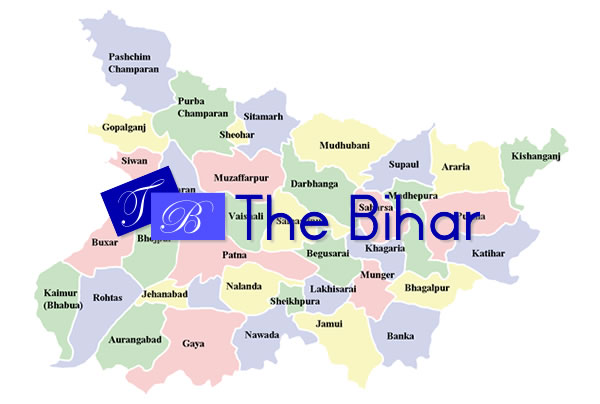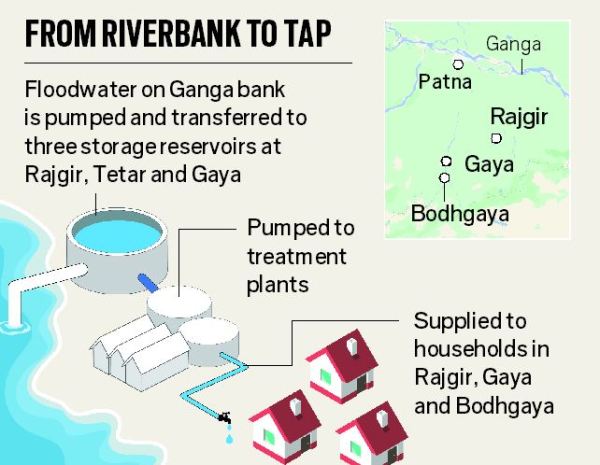Bihar has highest rate of crime against SC/STs, Bengal lowest: NCRB data
4 min read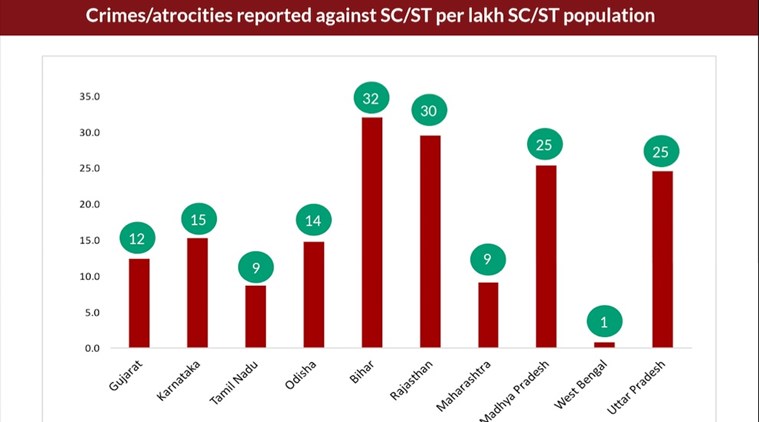 The infographic shows that there is a wide discrepancy amongst states in terms of the number of cases reported, with some states reported very few cases (West Bengal) despite a having a large population, while other report a high number of cases despite having a relatively lower population (Bihar). (Infographics: Swaniti Initiative)
The infographic shows that there is a wide discrepancy amongst states in terms of the number of cases reported, with some states reported very few cases (West Bengal) despite a having a large population, while other report a high number of cases despite having a relatively lower population (Bihar). (Infographics: Swaniti Initiative)
General Trends for Crimes Against SCs
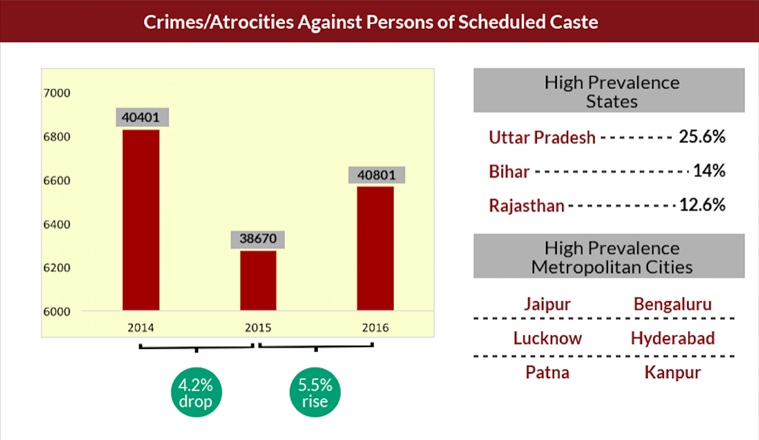 The infographic shows the number of crimes against SCs from 2014-16, with a significant fall in the number in 2015, and a subsequent rise in 2016. It also depicts the states and cities which have reported the highest number of crimes against SCs. (Infographics: Swaniti Initiative)
The infographic shows the number of crimes against SCs from 2014-16, with a significant fall in the number in 2015, and a subsequent rise in 2016. It also depicts the states and cities which have reported the highest number of crimes against SCs. (Infographics: Swaniti Initiative)
Since 2014, crimes against SCs have increased one percent overall, although there was a steep rise of 5.5 percent in 2016. As per 2016 statistics, Uttar Pradesh accounts for over a quarter (25.6 percent) of these crimes in 2016, followed by Bihar and Rajasthan. This is further reflected in the fact that their respective capital cities constitute almost 45 percent of the total crimes against SCs among all 19 metropolitan cities. States with low prevalence of violence include West Bengal (0.3%), Jharkhand (1.3%) and Kerala (2%). Coimbatore and Chennai have emerged with the lowest prevalence of violence against SCs amongst all metropolitan cities, with 0.2% and 0.6% respectively.
General Trends for Crimes Against STs
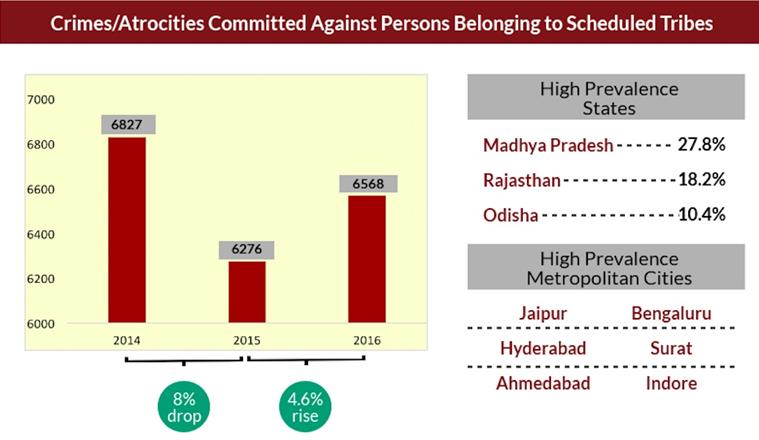 The infographic shows the number of crimes against STs from 2014-16, with a significant fall in the number in 2015, and a subsequent rise in 2016. (Infographics: Swaniti Initiative)
The infographic shows the number of crimes against STs from 2014-16, with a significant fall in the number in 2015, and a subsequent rise in 2016. (Infographics: Swaniti Initiative)
Since 2014, crimes against STs have seen as overall decrease of 3.8 percent, with a significant drop of 8 percent in 2015. However, there was a rise of 4.6 percent in 2016. According to 2016 statistics, Madhya Pradesh accounts for a large proportion of crimes against SC/STs in 2016 (27.8%), followed by Rajasthan (18.2%) and Odisha (10.4%). States with a high number of crimes against STs like Madhya Pradesh show a low number of crimes in metropolitan cities such as Indore, which reports only 0.3 percent of total crimes against STs in the state. Strikingly, Jaipur accounts for over half the number of crimes in metropolitan cities (55.3%). It is followed by Hyderabad with a proportion of 13.2 percent.
The Role of Police
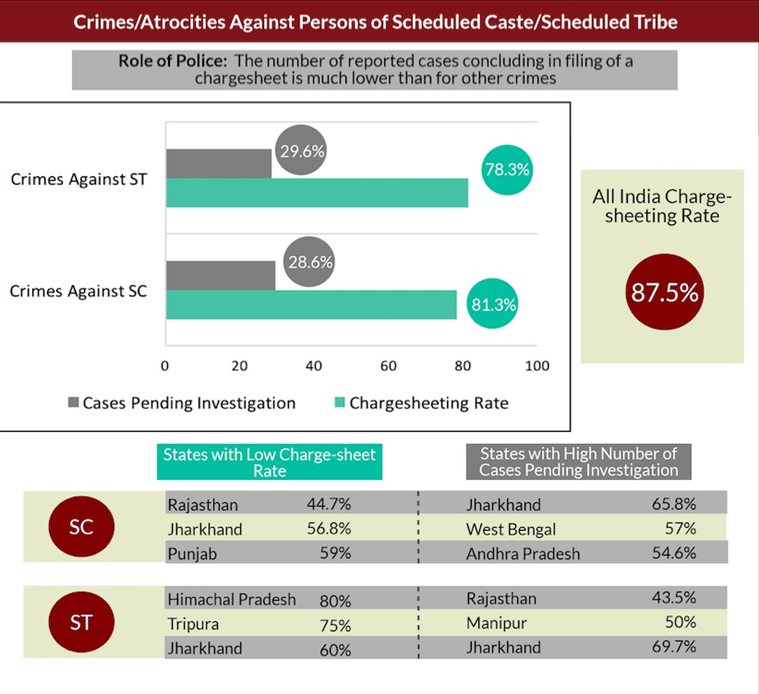 This infographic shows the all-India number of reported cases in which chargesheets are filed, and the number of cases still pending investigation by the police. This is put in the context of the all-India charge-sheeting rate. The analysis reveals that the number of reported cases concluding in filing of a chargesheet is much lower than for other crimes. (Infographics: Swaniti Initiative)
This infographic shows the all-India number of reported cases in which chargesheets are filed, and the number of cases still pending investigation by the police. This is put in the context of the all-India charge-sheeting rate. The analysis reveals that the number of reported cases concluding in filing of a chargesheet is much lower than for other crimes. (Infographics: Swaniti Initiative)
The police play a crucial role in ensuring that SC/ST populations are protected under The Scheduled Castes and Scheduled Tribes (Prevention of Atrocities) Act, 1989. They are responsible for ensuring that a chargesheet is filed once a case is reported, and that all cases are then investigated and forwarded to the hearing stage.
In 2016, a total of 39629 cases were filed by SCs, with the highest number being disposed of in Chhattisgarh (5479). A total of 6490 cases filed by STs were disposed of, with the highest disposal occurring in Madhya Pradesh (1805).
Of all cases filed by SC/STs under the act, almost 30 percent are still pending investigation. On a state level, this proportion is highest for both SC and ST in Jharkhand (65.8% and 69.7% respectively). In contrast, some states record very low number of pending cases for SC and ST such as Madhya Pradesh (9.7% and 7%).
The rate at which the police files chargesheets for reports of violence against SCs and STs (78.3% and 81.3%) is also lower than the national rate of chargesheeting (87.5%).
High conviction rates, but huge backlog
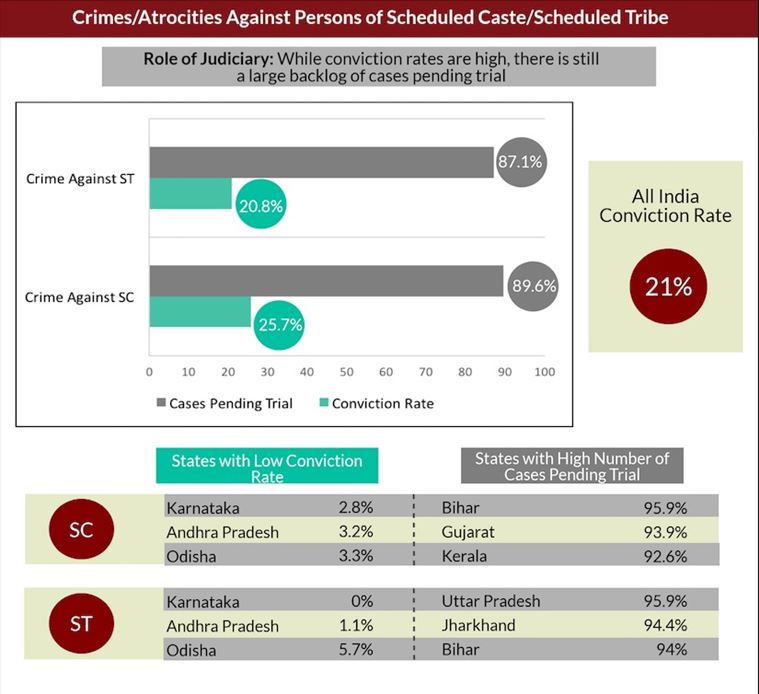 This infographic shows the all-India number of cases in which the judiciary has convicted the accused. It also shows the number of cases still pending trial in the courts. This is put in the context of the all-India conviction rate. At the state-level, the infographic lists the number of states reporting low conviction rates, as well as those reporting high number of cases pending trial. Analysis reveals that while conviction rates are high, there is still a large backlog of cases pending trial. (Infographics: Swaniti Initiative)
This infographic shows the all-India number of cases in which the judiciary has convicted the accused. It also shows the number of cases still pending trial in the courts. This is put in the context of the all-India conviction rate. At the state-level, the infographic lists the number of states reporting low conviction rates, as well as those reporting high number of cases pending trial. Analysis reveals that while conviction rates are high, there is still a large backlog of cases pending trial. (Infographics: Swaniti Initiative)
The judiciary is the body in charge of enforcing the rights of SC/STs under the Act, by conducting a fair trial and convicting the persecutor in case of guilt. Conviction rates for cases involving SC/ST atrocities are slightly below the All-India rate (21%) for STs (20.8%), and are significantly higher in cases involving SCs (25%). Conviction rates are particularly low in states of Karnataka, Odisha and Andhra Pradesh.
However, there are still a large number of pending cases involving SC/ST atrocities, showing that justice is being delayed. States like Bihar show a very high pendency rate for both SC and ST cases (95.9% and 94%). Almost all states have a pendency percentage above 80%, representing an extreme backlog across the nation.
Note on Rajasthan
At the police investigation stage, a total of 1063 cases were disposed of by the police due to a mistake of fact by the victim, or due to it being deemed a false case. Out of these cases, 691 of these took place in the state of Rajasthan.
Further, amongst the cases disposed of by the courts, an interesting trend is seen for plea bargaining in cases of violence against SC/STs. In 2016, 38 cases were disposed of using the method of plea bargaining, and all of them were witnessed in the state of Rajasthan.
Courtesy: The Indian Express

